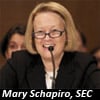Recently installed circuit breakers by trading venues at the behest the Securities and Exchange Commission (SEC) will not be sufficient to prevent another 6 May-style ”flash crash', according to a white paper from US agency brokerage Jones Trading.
On 6 May, US equity and futures markets briefly went into freefall, with the Dow Jones Industrial Average index plunging by 998.5 points in a matter of minutes before rebounding. The SEC reacted by demanding the implementation of circuit breakers for S&P 500 constituents across all US equity markets that would halt trading in any stock for five minutes should its price deviate by 10% in the preceding five-minute period, on June 11 on a six-month pilot basis.
In a speech to the Economic Club of New York on 7 September, SEC chairman Mary Schapiro stated that the next steps for developing the circuit breakers would be to include a “careful review of a limit up/limit down procedure that would directly prevent trades outside specified parameters, while allowing trading to continue within those parameters”.
In addition, the Financial Industry Regulatory Authority, an independent financial regulator, is reportedly looking at ways to improve the circuit breaker regime for off-exchange trades that could trigger trading stops if they are executed 10% away from the last traded price.
But instead of using “rapid reaction” tactics such as circuit breakers, Jones Trading's paper, titled ”May 6, 2010: A market odyssey', notes that a reliance on technology for trade execution has led to “the illusion that machines can and will exercise the same judgement as people will”.
“What happens when the machines take over and humans cannot control what occurs?” asks author Scott Cooper, director of marketing at Jones Trading. “May 6 was the first and likely not the last such event either in kind or duration.”
The paper calls for a back-to-basics approach, with more protection afforded to issuers and investors. Jones Trading's concerns were recognised by Schapiro speech, in which she admitted that retail broker-dealers have noticed outflows from individual investors since 6 May.
“[This] trend is troubling, particularly if concerns about equity market structure are playing even a small part in investor decision-making,” said Schapiro.
Jones Trading's note also launched a scathing attack on the role of high-frequency traders, accusing them of raising quote-to-execution ratios to “ridiculous proportions” and causing traditional asset managers to move their liquidity to dark pools, thereby creating liquidity and transparency problems.
“HFTs are akin to market jackals, scavenging off the legitimate strategies of longer term investors while simultaneously touting their importance to market health,” wrote Cooper.
In her speech, Schapiro also acknowledged worries about the role of high-frequency traders, in particular, the practice of quote stuffing, i.e. the practice of sending then cancelling a large amount of orders in particular stocks with the aim of misleading or slowing the market down to create arbitrage opportunities.
Pointing out that high-frequency traders typically cancel 90% or more of orders they submit to the markets, the SEC chairman stressed that regulators are looking at whether large swathes of cancelled orders could constitute fraudulent or other improper market behaviour.
Schapiro added that a joint report from the SEC and Commodities Futures Trading Commission examining the events of 6 May will be published in the coming weeks.
Jones Trading also called for a bolstering of the regulations governing the activities of electronic market makers, which use high-frequency trading strategies to provide two-sided markets.
Three electronic market makers – Knight Capital, Virtu Financial and GETCO – have taken matters into their own hands, suggesting a set of rules to the SEC that they consider would effectively govern how similar firms operate.
“There must be a role for traditional asset mangers to be incentivised to return to fair treatment in the markets precisely because they represent investor liquidity and interest,” said the paper.
